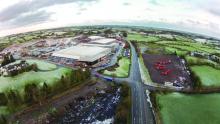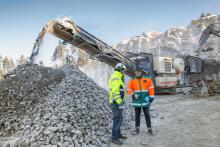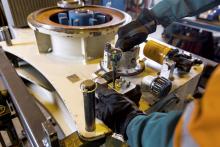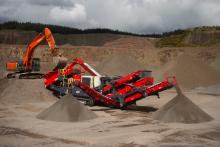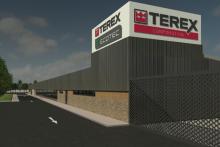Northern Ireland’s eminence in the global aggregates production industry has been emphasised by a significant investment by one leading global equipment maker in its Co. Tyrone-based manufacturing and assembly facility. Meanwhile, another leading sector player is to open its own new cutting-edge production site in a different part of the country. Guy Woodford & Munesu Shoko report in our sister title Aggregates Business.
Sandvik Mining & Rock Technology’s (Sandvik) ultra-modern manufacturing and assembly site in Ballygawley, Co. Tyrone, Northern Ireland, has a rich aggregates processing equipment history. The 18-acre plot housing three factory buildings and 300 employees involved in the production of various Sandvik tracked mobile crushing and screening plant, used to be home to a large fabrication factory belonging to John Finlay, the founder and owner of Finlay Hydrascreens, now part of Omagh-headquartered Terex Finlay. John’s widow, Lily, still lives in a house located just above the Sandvik Ballygawley facility, where the couple’s grandson, Jake, works as an inventory planner.
Having moved its manufacturing capabilities from Swadlincote, Derbyshire, England, to Ballygawley in 2014, the last four years have seen Sandvik make huge investments in its Northern Ireland site, creating one of the world’s premier manufacturing facilities for mobile crushers and screens.
In late 2017, Sandvik Ballygawley’s shot blasting area for large components was expanded and upgraded. The enlarged area also reduced the amount of landfill waste linked to the previous operation. The previous shot blast system used a shot material called ‘JBlast’ which could only be used once. This hazardous waste was then collected and sent to landfill. The new shot blast technology has ended the consumption of copper ore, replacing it with a chilled iron material. This material can be recycled up to 10 times, thereby reducing overall landfill waste by an impressive 96%. The improved shot blasting area is also self-contained under one roof, eradicating any potential quality imperfections caused by parts being exposed to the elements. It also creates a better working environment for employees.
The introduction of an enhanced shot blasting capability followed on from the £1.6 million investment in a state-of-the-art powder coating plant, replacing a traditional wet paint shop. Installed in 2015, the powder coating plant is benefiting customers by improving machine edge protection and increasing a plant’s corrosion resistance. Consisting of a load area, a shot blast, a prime-powder, a green-cure oven, a top-coat powder and a main oven, the powder coating plant uses a high-tech vacuum system so that more than 95% of all unused powder is captured and recycled.
The shot blasting area, powder coating plant and other manufacturing and assembly facility improvements have enabled Sandvik Ballygawley to increase the number of plant models it can supply each year. This is helping the Swedish global market original equipment manufacturer (OEM) cope with challenges associated with meeting greater customer demand for new and proven aggregates processing plant.
Among the models being manufactured and assembled at Sandvik Ballygawley are the Hillhead 2018 UK exhibition-unveiled QH332 DDHS (double-deck hanging screen), said by Sandvik to be the ultimate in tracked, mobile cone crushing technology. Based on the QH331 mobile cone crusher, the QH332 DDHS Hydrocone crusher comes with the functionality of a double- or single-deck (utilising the top deck as a breaker deck) hanging screen in fully detachable, standalone form. Detachable or attachable without the use of additional lifting equipment, the QH332 DDHS delivers multi-functionality as a one, two or three-way split screener, as well as being an ultra-efficient and productive cone crusher.
During an Aggregates Business magazine tour of Sandvik Ballygawley in late 2018, Austin Walsh, the facility’s manufacturing engineer manager, stresses how employee safety, quality and production scheduling efficiency are, in that order, the top three day-to-day priorities for the Sandvik Ballygawley team. Emphasising the commitment to quality, Walsh explains how each manufactured plant goes through 40-50 quality inspection points during its manufacturing and assembly. Only around 20% of the basic steel fabrication work required on each plant takes place at the Ballygawley facility, with the rest contracted out to local firms. This, says Walsh, frees up critical manufacturing and assembly space.
Staff working in the manufacturing and assembly facility work one of two nine-hour shifts Monday to Thursday, from 7am-4pm and 4pm to 1am. An extra hour’s overtime on the day or night shift is available during peak production periods. Friday’s two daily shifts are shorter, from 7am-1pm and 1pm-5pm. Further overtime is also offered on Friday evenings and Saturdays during peak production weeks.
Crucially, Sandvik’s significant investment in its Ballygawley site has halved the average time it takes to produce a crushing and screening plant, now 29 days, compared to 57 days three years ago. This has dramatically reduced customer lead times in the very competitive mobile tracked plant section of the global crusher and screener model market.
During our trip, we watched engineering technicians at work on a wide variety of mobile cone crushers and screeners, with a QH332 DDHS Hydrocone crusher and QA451 Mobile Doublescreen among finished models waiting in the yard for dispatch to a customer.
“There’s a culture of change within this company and its very prevalent,” summarises Walsh. “In the last three years we have exceeded all our expectations. But where we are at the minute is not where we want to be in three years’ time.”
Terex Corporation – whose Terex Materials Processing business segment is a major global player in materials processing equipment - is to open a new £12 million (€13.95mn) manufacturing facility in in Derry, Northern Ireland.
The new 9,755m² manufacturing facility will focus on the design, manufacture and development of Terex Ecotec (waste management and recycling) and Terex Conveying Systems (TCS) (mobile conveying) product lines.
Kieran Hegarty, president of Terex Materials Processing, said: “As part of our growth strategy, we continually review markets to identify potential opportunities. The waste management, recycling and mobile conveying sectors are areas of significant growth and our objective is to be recognised as a leading global manufacturer in these areas. Our Terex Campsie facility will enable us to realise this ambition.”
The Terex Ecotec product line has grown significantly since it was established in 2014 as a strategic response to meet the specialised needs of customers in the growing waste management and recycling sector. The Terex Campsie facility will focus on developing advanced waste management and recycling products and services for Terex Ecotec customers with the goal of becoming a global leader in the industry.
Terex Conveying Systems was established to respond to increasing demand for mobile conveying systems which, as well as being complementary to existing core segment Terex Materials Processing crushing, screening and shredding equipment, will help enable Terex to enter the port and terminal industry. The mobile conveying range is designed to offer a number of advantages to traditional wheeled conveyor systems, including being cheaper to run, improved efficiency, a reduction in production costs, a reduced environmental impact, improved health and safety and improved product quality. The Terex Campsie facility will manufacture four new products in the conveying range and will facilitate ongoing product development.
Work is already underway at the Terex Campsie facility and is planned to be operational later this year. The facility will initially create approximately 100 new jobs that include production operative roles, management and support roles in HR, operations and finance, as well as a highly skilled engineering team that will be trained to leverage the company’s cutting-edge engineering capabilities and lead the development of Terex Ecotec and Terex Conveying Systems product portfolios.
Hegarty continues: “Our investment of this size in a new facility will support our ongoing growth and development as we seek to build on the momentum of increased demand for our products globally.”
In a pioneering development, Metso and its southern African distributor, Pilot Crushtec International, have rolled out an industry-first, standard five-year/ 10,000-hour warranty on all Metso crushers and screens.
The move ushers in a new era in the crushing and screening industry where a one-year/2,000-hour warranty is generally the norm on these mission-critical assets. Francois Marais, director – Sales & Marketing at Pilot Crushtec International, says the move is informed by the supplier’s and its principal’s understanding that warranty is a valuable component to any capital equipment purchase, especially mission-critical and big-ticket purchases such as crushers and screens.
Marais says the standard five-year/10,000-hour warranty for southern African customers is a true indicator of Metso’s confidence in its product. It is also a sign of service commitment from Pilot Crushtec International as the exclusive distributor of Metso’s aggregates products and services, including static, tracked and wheeled crushers, scalpers and screens in the region.
“We have been offering this warranty for the past six months on a pilot basis to gauge the level of interest and feedback from our customers. Effective the 1st of January this year, we were able to broker a deal with our principal, Metso, to standardise the five-year/10,000-hour warranty across the whole Metso product range we supply,” says Marais.
“The initiative is in the best interests of the consumer. A long product warranty gives customers some extra coverage for their big-ticket purchases, along with a little more peace of mind. From an OEM perspective, it says a lot about the confidence in the brand. From a supplier point of view, it also means that we want to be there for our customers for the long haul and be involved in their businesses with a vested interest,” explains Jorge Abelho, director – Technical and Customer Support at Pilot Crushtec International.
As part of the Metso Life Cycle Services for Aggregates, Metso has previously offered its Equipment Protection Services (EPS) as an optional extra. The comprehensive plan includes extended warranties and scheduled inspections with Metso-certified technicians. EPS is built on three core elements: extended warranty to five years or 10,000 hours; scheduled inspections with Metso-trained and certified technicians, coupled with OEM parts recommendations; and maintenance planning and reporting for mobile equipment through Metso Metrics Services.
In southern Africa, this has since become standard. This gives equipment owners much-needed confidence in their cost structure by anticipating and minimising unexpected equipment failures. The warranty covers the whole machine, excluding wear parts, for the first 4,000 hours, which is double the industry-wide 2,000 hours standard warranty. From 4,000 to 10,000 hours, the warranty only covers all the critical components.
“It made sense for us to package it as a standard offering. We believe in our quality and know that if customers prescribe to OEM servicing levels, their equipment will last longer and perform better. The extended warranty also assures our customers that the OEM and the supplier are ready to deliver on their promise,” says Marais.
“As part of the warranty, our Metso-certified technicians will undertake field inspections every 1,000 operating hours. During these visits, they will identify preventative and/or correction actions and provide recommendations accordingly,” concludes Abelho.
